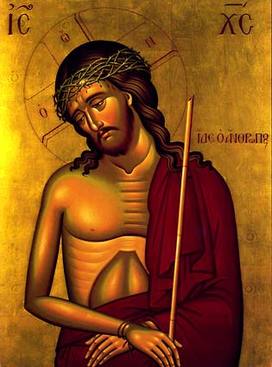|
Fasting, or abstaining from food, was a discipline practiced by our Lord himself. It was after forty days of prayer and fasting in the wilderness, that Jesus victoriously faced the temptations of the devil (Matthew 4:1-11). He asked his disciples to use fasting, coupled with prayer, as a means to achieve spiritual victories (Matthew 17:21; Mark 9:29; Luke 2:37), and the example of the Lord was followed by the disciples in their apostolic ministry and instruction to the early Christians (Acts 14:23; 27:9; 1 Corinthians 7:5; 2 Corinthians 6:5, 11:27).  The practice of fasting is rich with meaning. Many of the Holy Fathers throughout the history of the Church have written about the significance of fasting. Saint Basil, for example, tells us that fasting is not simply abstaining from food; it is, more importantly, the avoidance of sin. The Church in her hymnology describes fasting as the mother of chastity and prudence, as the accuser of sin and as the advocate of repentance, the life worthy of angels and the salvation of humans. Fasting becomes all of these when observed in the proper spirit. In its most basic sense, fasting is abstinence from food. But it is far more than that. Through a very natural process created by God, we consume food for sustenance, energy, and life. However, we can be inclined to take more than we need or to be so controlled by our physical desire that we focus only on what we eat, neglecting our relationships and our spiritual needs, and even endangering our well-being. By subordinating the desires of the body, fasting helps us reestablish a proper order in our lives as Christians. It helps us to open our minds and souls to the guidance of the Spirit and to break away from our captivity to bodily appetites and selfish desires. Through fasting we overcome the burdens and pressures of physical gratification that are placed upon us in our world, and through our faith in Christ we are renewed and transformed into the holy people God created us to be. In addition, through fasting we move away from an entanglement and conformity to sinful passions and desires, into a blessed life filled with the presence, power, and grace of God. By fasting, we also demonstrate the sincerity of our repentance. Adam and Eve disobeyed God by refusing to fast from the forbidden fruit. They were controlled completely by their own desires. But now through fasting, through obedience to the discipline of the Church regarding the use of spiritual and material goods, we may return to the life in Paradise, a life of communion with God. Thus, the discipline of fasting is a means to salvation. It aids our journey from sin and death to eternal life by helping us focus on our need for God’s grace and forgiveness. Through fasting we are engaged in the struggle against sin, and through discipline and abstinence, the sincerity of our repentance is affirmed. This is why fasting is a regular practice for Orthodox Christians. Fast days and periods have been established by the Church throughout the year to help us direct our hearts and minds toward the life of prayer and worship, our spiritual needs, and the condition of our souls and relationship with God. During most weeks, Wednesday and Friday are fast days. On these days, we are guided to abstain from meat, dairy products and oil and wine. On some days, fish, wine, and oil may be permitted if a specific feast falls on a Wednesday or Friday or a portion of a fast is not as strict as other times. The calendar and practice of the Church has fasting periods, which include the forty days of Great Lent and Holy Week, before Pascha, the Nativity Fast (November 15-December 24), the Apostles Fast (the Monday after the Sunday of All Saints to June 28) and the Dormition Fast (August 1-14). For the complete fasting calendar you The calendar and practice of the Church has fasting periods, which include the forty days of Great Lent and Holy Week, before Pascha, the Nativity Fast (November 15-December 24), the apostles Fast (the Monday after the Sunday of All Saints to June 28) and the Dormition Fast (August 1-14). For the complete fasting calendar you can speak with your parish priest or visit the Online Chapel at http://www.goarch.org/chapel. Because there is a great diversity in fasting disciplines people observe, you should also consult your parish priest about how to incorporate the discipline of fasting into your religious life. Because of the liberating effect of fasting, both material and spiritual, the Church has connected fasting with the celebration of the major feasts of our tradition. Pascha is, of course, the most important feast of the Church. It is the “Feast of feasts.” It is the feast of our liberation from the bondage of sin, from corrupted nature, from death. For on that day, through His Resurrection from the dead, Christ has raised us “from death to life, and from earth to heaven” (Resurrection Canon). Christ, “our new Passover,” has taken us away from the land of slavery, sin and death, to the promised land of freedom, bliss and glory; from our sinful condition to resurrected life. It is most appropriate to prepare for this celebration through both material and spiritual fasting. During Great Lent, which culminates in the period of Holy Week and our celebration of Pascha, fasting has a more profound meaning. During this forty day period of Great Lent, a period that reflects our ongoing journey from death to life, our Orthodox Church prescribes a more intense fast as an aid in repentance and transformation. Fasting, along with prayer, worship and living during this sacred period of the year, leads us to reflect upon how we should live always in relationship with God and to commit to a life of faith and holiness. In this way, the entirety of the year, and each day of our lives, moves us closer to eternal salvation in the Kingdom of God. In the practice of fasting it is important to remember that we are not fasting simply for the sake of fasting. Our observance of the fasting days and periods of the Church is for our spiritual growth and greater communion with God. It is not to be a superficial practice aimed at obtaining the praise of others. Fasting is also not intended to be so all-consuming that we become fixated by how we can design methods and recipes to experience enjoyable food without breaking the “rules.” No matter how austere our fast or how much in accordance our fast may be with purely technical “rules,” it is void of faith and grace if we are not also committed to prayer and worship, study and growth in our knowledge of our Faith, and philanthropic and charitable acts. As Orthodox Christians, let us cherish fasting as a vital part of our spiritual lives and practice. Let us experience the great joys that come through fasting as it contributes to a life of repentance and prayer. And in following the wise and spiritual traditions of the Church, let us offer all “to fight the good fight, to walk the way of fasting…to prove ourselves victorious over sin, and without condemnation to reach our goal of worshiping the Holy Resurrection,” our goal of eternal life. (Prayer of the Presanctified Liturgy). Text taken from the "Faith & Life" Series of the Greek Orthodox Archdiocese of America. Pamphlet available for download here: www.goarch.org/ourfaith/faithandlife/fasting.pdf
|
Topics
All
|

 RSS Feed
RSS Feed
